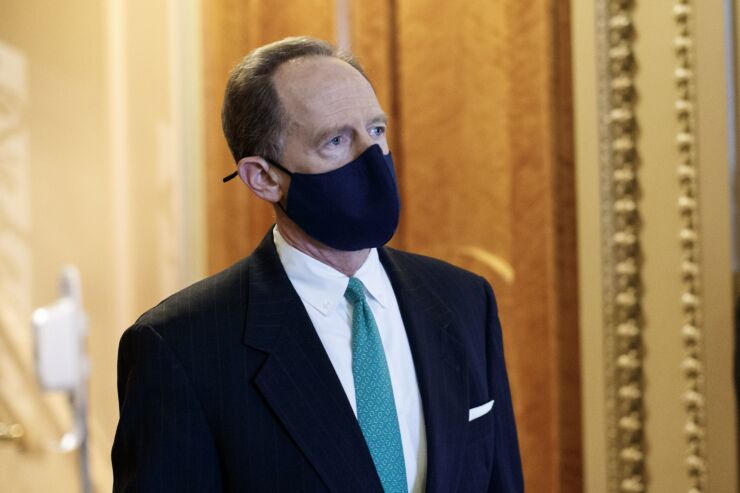WASHINGTON — Sen. Pat Toomey, R-Pa., signaled that he would support a compromise coronavirus stimulus package after congressional leaders agreed to modify restrictions on the Federal Reserve’s emergency lending powers.
Lawmakers were planning to hold a vote as early as Monday on the roughly $900 billion pandemic relief bill. The legislation includes more than $280 billion for small-business lending efforts
The relief bill had hit a potential snag over a GOP proposal backed by Toomey aiming to prevent the Fed from reviving certain credit facilities — launched through the Coronavirus Aid, Relief, and Economic Security Act — that the central bank previously agreed to shut down at year-end. But Democrats claimed the Republican plan would unnecessarily restrain the Fed's emergency powers under 13(3) of the Federal Reserve Act.
Toomey agreed to modify the amendment to explicitly state that the Fed cannot recreate facilities that are identical to the CARES Act programs.
“I am very pleased with the conclusions that we have come to on how we have handled the 13(3) CARES facilities,” Toomey, who will chair the Senate Banking Committee in 2021 if Republicans maintain their majority, said in a call with reporters on Sunday. “I think the good outweighs the bad and it is my intention to vote for it.”

Toomey's
“There was a complaint from the Democrats that my initial language was too broad and could be interpreted as too sweeping," Toomey said. "So we ended up narrowing the language versus what we had originally put on the table."
The CARES Act facilities affected by the legislation include the Main Street Lending Program, through which the Fed can buy pieces of bank loans issued to midsize businesses hampered by the pandemic. They also include the Primary Market Corporate Credit Facility, Secondary Market Corporate Credit Facility and Municipal Liquidity Facility.
Toomey said the agreement still achieves his original goals, including to ensure that unused CARES Act funds could be diverted away from the Fed for future use.
“Goal No. 1 was to sweep the funds, the unused funds, out of the accounts, and repurpose that money for other purposes,” Toomey said. “Goal No. 2 was to shut down the three facilities that needed to be shut down. No. 3 was to forbid the reopening of those facilities, make it clear that the shutdown was permanent and cannot be reversed without coming to Congress. And No. 4 would be to ban a clone.”
Toomey also rejected Democrats' criticism that his intention was to stifle the incoming Biden administration's ability to respond to an economic crisis. He said his goal was to keep the Fed from being politicized and succumbing to Democratic calls to lend to municipalities and other favored groups.
“The Fed would be in a position of having to decide whether or not it is going to comply with the pressure that it would be under to start doing an activity they know they shouldn’t be doing, and then there would be competing pressure to do all kinds of other things for preferred constituencies,” Toomey said.
However, Toomey signaled that should the economy experience more distress in 2021, he would be open to legislation enabling the Fed to recreate its CARES Act facilities.
“If they thought they need these specific programs again, I think that’s quite unlikely, but it could possibly happen,” he said. “If they make the compelling case, then we should give it to them.”
The stimulus legislation also includes $284.5 billion for the Small Business Administration’s Paycheck Protection Program for first- and second-time borrowers, $20 billion for the Economic Injury Disaster Loan advance program, $25 billion in emergency rental assistance and $12 billion in funding for community development financial institutions and minority depository institutions.
The legislation includes key provisions sought by the banking industry. CECL compliance was delayed to January 2022. The compromise bill also strips language from the CARES Act stipulating that borrowers receiving





